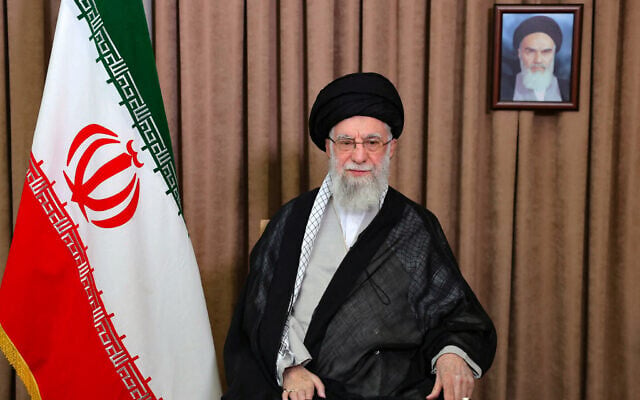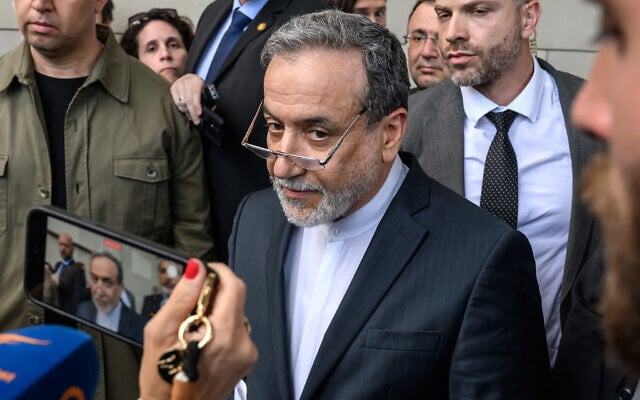



Foreign Minister Gideon Sa’ar said Saturday that the IDF has set back by at least two years Tehran’s ability to attain nuclear arms, and hinted that Israel could make regime change in Iran an official aim of the war.
“According to the assessment we hear, we already delayed for at least two or three years the possibility for them to have a nuclear bomb,” Sa’ar told German newspaper Bild in an interview published Saturday.
During the interview, which was conducted in Jerusalem in English but dubbed in German, Sa’ar rejected diplomacy with Iran and said the IDF would keep striking the country. “We will do everything that we can do there in order to remove this threat,” he said.
He also said Israel had three war aims in Iran: targeting its nuclear program, missile production and top officials.
“The Security Cabinet hasn’t designated regime change as a goal in this war. Not yet, at least,” said Sa’ar. He declined to say whether Israel would seek to assassinate Iran’s Supreme Leader Ayatollah Ali Khamenei: “We never talk in advance about what we’ll do.”
On Thursday, Defense Minister Israel Katz threatened Khamenei directly, even as US President Donald Trump has reportedly vetoed an Israeli hit on the supreme leader, and said Washington was holding off on such a move.
Trump on Friday reiterated that he would decide within two weeks whether to join Israel’s strikes on Iran’s nuclear program, and indicated that he was disinclined to restrain Israel “when it’s winning” the war. He was also dismissive of tentative nuclear talks that European foreign ministers held with their Iranian counterpart earlier in the day.
The US president has said Israel’s June 13 opening strike on Iran after the 60-day window that he gave Tehran to strike a nuclear deal.
Speaking to Bild, Sa’ar said: “I don’t really believe in diplomacy with Iran. All efforts at diplomacy have failed.”
The Iranians “usually use these talks to deceive, buy time, and make more progress” on their nuclear program, said Sa’ar.
“I don’t believe they’ll change their behavior,” he added, reaffirming Israel’s position that Iran must give up uranium enrichment entirely — a key obstacle in the suspended Iran-US nuclear talks.
Though Iran publicly rejects nuclear weapons, it has amassed uranium enriched to a degree far beyond what is needed for civilian use, and a short step away from weapons grade, according to a report last month from the International Atomic Energy Agency, the UN nuclear watchdog.
“Diplomacy is not a magic formula for whitewashing states’ positions,” said Sa’ar. “I have yet to see any concrete offer from the Iranians that indicates they’ve changed their minds. Currently, they aren’t even cooperating with the IAEA.”
Sa’ar said European countries have “a very important role to play” in protecting Jews and Israelis on the continent from Iran’s attempts to attack them, “probably now more than ever.”
He praised German Chancellor Friedrich Merz, who said at a G7 summit in Canada on Tuesday that Israel was doing the “dirty work… for all of us.”
“I think he’s shown leadership with a genuine analysis of the situation and the dangers that Iran poses to the world and the international community,” said Sa’ar of Merz.
The Bild said the interview took place as the top diplomats from Britain, France, Germany and the European Union met with Iranian Foreign Minister Abbas Araghchi in Geneva, urging him to resume nuclear talks with the US.
French Foreign Minister Jean-Noel Barrot said, “We invited the Iranian minister to consider negotiations with all sides, including the United States, without awaiting the cessation of strikes, which we also hope for.”
But Araghchi told NBC News after the meeting that “we’re not prepared to negotiate with [the US] anymore, as long as the aggression continues.”
On Saturday, Araghchi arrived in Istanbul for a meeting of the Organisation of Islamic Cooperation (OIC) to discuss the war with Israel, according to Iran’s semi-official Tasnim news agency.
Israel says its sweeping assault on Iran’s top military leaders, nuclear scientists, uranium enrichment sites, and ballistic missile program is necessary to prevent the Islamic Republic from realizing its avowed plan to destroy the Jewish state.
Iran has retaliated by launching over 470 ballistic missiles and around 1,000 drones at Israel. So far, Iran’s missile attacks have killed 24 people and wounded thousands in Israel, according to health officials and hospitals. Some of the missiles have hit apartment buildings, causing heavy damage.
Meanwhile, a US-based NGO, the Human Rights Activists News Agency, said on Friday, based on its sources and media reports, that Israeli strikes have killed at least 657 people in Iran, including 263 civilians. The figures could not be independently verified.
Iran’s government has not updated its tolls since Sunday, when it said that Israeli strikes had killed at least 224 people, including military commanders, nuclear scientists and civilians.




